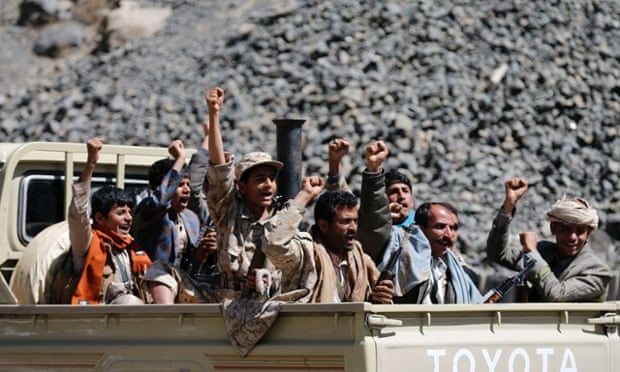Resolution does not allow for military enforcement of demands, despite calls from Arab countries for use of force against Houthis

The UN security council on Sunday unanimously adopted a resolution demanding that Shia rebels immediately relinquish control of Yemen’s government in a crisis that has pushed the Arab world’s poorest country near collapse.
Arab countries have been pressing for the use of military force against what they call the rebel group’s “illegitimate seizure of power”. But the resolution approved by all 15 council members at an emergency meeting does not act under chapter seven of the UN charter, which would allow it to be militarily enforced.
The resolution, co-sponsored by 10 countries including the US, demands that the Houthi rebels “immediately and unconditionally” withdraw forces from government institutions and engage “in good faith” in UN-led peace talks.
“It was clear the world was waiting for a powerful message from the UN security council,” British ambassador Mark Lyall Grant told the council. “The Houthis must take responsibility for their actions and stop using violence and coercion as political tools.”
It was the council’s first resolution on Yemen since the current crisis with the rebels began. “This resolution is overdue,” New Zealand ambassador Jim McLay said. He called the Houthi takeover a “coup d’etat”.
The Houthis’ takeover that began with seizing the capital, Sana’a, in September has raised alarms that the world’s most dangerous branch of al-Qaida, based in Yemen, would use the chaos to its advantage. The Houthis and the militant Sunnis of the al-Qaida branch are bitter rivals.
Worried that Shia powerhouse Iran is backing the rebels, foreign ministers of the largely Sunni six-nation Gulf Co-operation Council (GCC) on Sunday urged the security council to intervene. They warned that if the world failed to respond they were prepared to take action on their own to maintain regional security and stability. They did not elaborate on what measures the group might take.
The security council resolution also demands that the Houthis release US-backed president Abed Rabbo Mansour Hadi and his cabinet from house arrest. Hadi resigned last month after the rebels dissolved the parliament.
The GCC ministers had demanded that the resolution impose sanctions against anyone “hampering the process of peaceful transition of power”. The resolution only calls for “further steps” if the parties in Yemen fail to implement the resolution.
Other departures from the GCC’s wishes included dropping a reference to the Houthis’ takeover as a “coup” and strongly deploring, instead of condemning, the rebels’ actions. Jordan’s ambassador, Dina Kawar, told reporters that “we wanted the resolution accepted by all members” of the council.
The GCC includes Yemen’s neighbours Saudi Arabia and Oman as well as Kuwait, Qatar, Bahrain, and the United Arab Emirates.
Saudi Arabia’s UN ambassador Abdallah Al-Mouallimi called the resolution “a milestone” and said: “We will be following up with the council on a daily basis.”
The UN secretary general, Ban Ki-moon, told the council on Thursday that Yemen was “collapsing before our eyes”. The US and several other countries closed their embassies in Yemen last week. The Houthis are generally hostile to US military intervention in the Middle East, placing in jeopardy US counter-terrorism operations that have included using drone aircraft to strike suspected al-Qaida sites in Yemen.
UN-led talks in Sana’a have made little ground, with envoy Jamal Benomar telling the security council on Thursday that Yemen was at a crossroads between “civil war and disintegration”. He said the political uncertainty had put pressure on the local currency, the riyal, and threatened to bring it to collapse.
“The people of Yemen deserve a clear path back to the political transition process and a legitimate government,” the US ambassador Samantha Power said on Sunday.
The resolution demands that all parties in Yemen “cease all armed hostilities against the people and the legitimate authorities of Yemen and relinquish the arms seized from Yemen’s military and security institutions”. It also calls on UN member states to “refrain from external interference which seeks to foment conflict and instability”.
Yemeni officials said Saudi Arabia, a staunch US ally, was sending arms and funds to tribesmen in Yemen’s Marib province to bolster them against the rebels. Saudi Arabia has not commented on the claims.
The Egyptians and Saudis are co-ordinating a joint military response to deal with any eventuality in Yemen, including the disruption of shipping through the corridor that runs past Yemen to Egypt’s Suez canal, according to Egyptian security officials. The officials in both Yemen and Egypt spoke on condition of anonymity because they were not authorised to talk to the media.
http://www.theguardian.com/world/2015/feb/16/un-security-council-passes-resolution-demanding-yemen-rebels-give-up-power
http://www.theguardian.com/world/2015/feb/16/un-security-council-passes-resolution-demanding-yemen-rebels-give-up-power
No comments:
Post a Comment